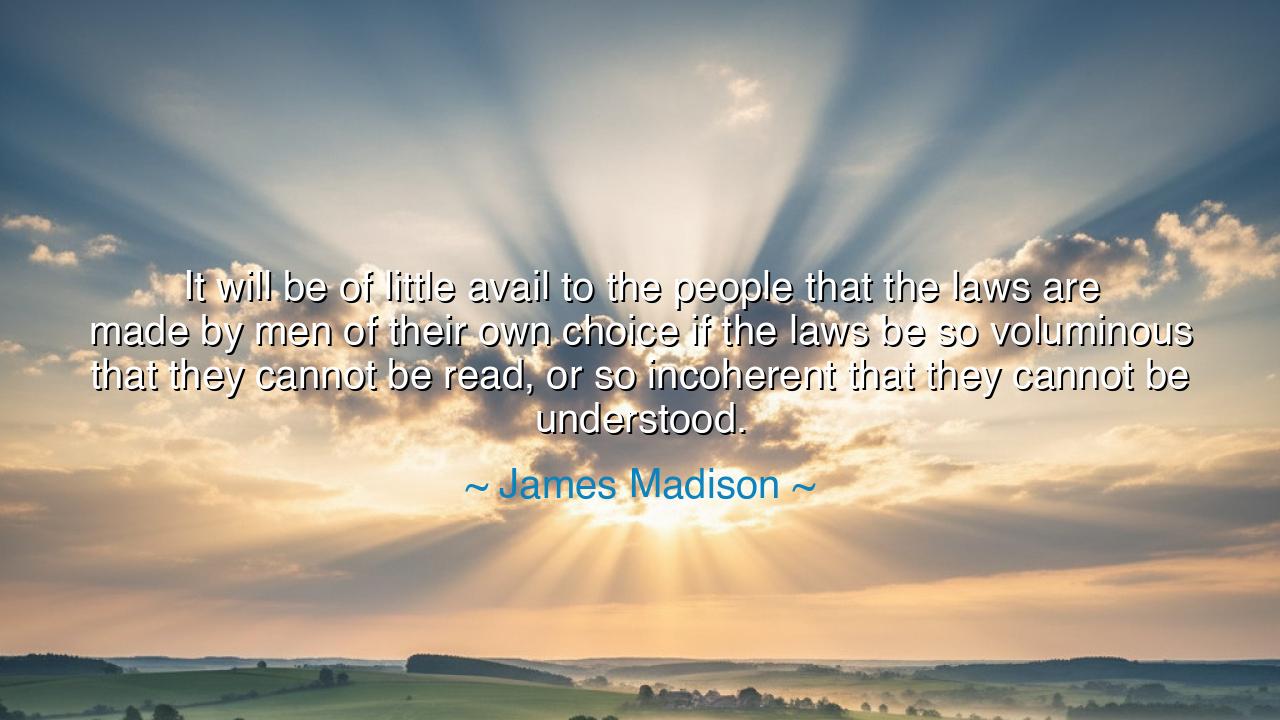
It will be of little avail to the people that the laws are made
It will be of little avail to the people that the laws are made by men of their own choice if the laws be so voluminous that they cannot be read, or so incoherent that they cannot be understood.






"It will be of little avail to the people that the laws are made by men of their own choice if the laws be so voluminous that they cannot be read, or so incoherent that they cannot be understood." These words, spoken by James Madison, resonate with a timeless truth about governance, law, and the very purpose of those who hold the power to rule. Madison, one of the founding figures of the American Republic, warns us of a crucial flaw in any system of governance—the danger that laws, though made by those we elect and choose, become so complicated, so confusing, or so overbearing, that they fail in their true purpose: to serve and protect the people. To craft laws that the people cannot understand or follow is to build a foundation of justice that is fragile and ultimately unfit for the needs of the nation.
From the ancient days of Mesopotamia, where the Code of Hammurabi was etched into stone for all to see, the idea of law has been central to civilization. These laws were not just rules to govern behavior; they were symbols of justice, order, and the will of the people. The famous phrase inscribed at the top of Hammurabi’s stone reads: "I have come to establish the laws of the land, to protect the weak from the strong." It was the very foundation upon which the society was built—transparent, clear, and understandable by all. In those ancient times, the law was written so that every citizen, from the humblest peasant to the greatest king, could know what was required of them. But as societies grew and became more complex, so too did the laws that governed them.
In Madison’s era, the newly formed United States was grappling with the challenge of creating a government that was not only just and effective but also accessible to its people. The early American Constitution itself was carefully designed to ensure balance, yet Madison understood that laws must remain comprehensible if they were to be truly effective. He foresaw the danger of a government that was weighed down by excessive legislation, filled with loopholes and ambiguities, that would make it nearly impossible for ordinary citizens to understand the very laws that governed their lives. Without clarity, the law would no longer be a tool of justice, but a means of oppression, wielded by the few against the many.
A modern example that brings Madison’s warning to life is the rise of the tax code. Over the years, tax laws have become so voluminous and so complex that they are virtually unreadable to the average citizen. While the intention of the tax code is to fairly distribute the burden of supporting the government, the sheer complexity of the system has created a situation where those who need to navigate it the most—ordinary citizens—are often left in the dark, unable to understand their rights and responsibilities. This creates a system in which only the wealthy or those who can afford the best lawyers and accountants can truly navigate the law. The result is that the purpose of taxation, to be a fair and transparent means of supporting the common good, becomes muddled, inaccessible, and ultimately fails to serve the people.
Madison's insight speaks to a broader truth: laws must serve the people, not enslave them. The greatest societies throughout history understood this fundamental principle. Ancient Rome, with its Twelve Tables, provided a foundational set of laws that could be understood by all and were meant to protect both the rights of individuals and the interests of the state. However, over time, the Roman Empire became mired in complexity, and the laws—once clear and accessible—grew increasingly disconnected from the citizens they were meant to govern. Roman citizens could no longer fully understand or participate in the legal system, and this lack of transparency contributed to the decline of the Republic.
The lesson that Madison offers is timeless. It is not enough to have laws made by those we elect or to have laws in abundance. What matters most is that these laws are understandable and accessible to all. The essence of justice lies in the ability of every citizen, regardless of their station, to comprehend the law and to know their rights and obligations. If laws become so complicated or incoherent that they are beyond the reach of the people, then the law no longer serves its true purpose. Rather than being a means of protection, it becomes a tool of control.
In your own life, carry this wisdom with you: whether you are involved in governance, business, or personal relationships, strive to ensure that your actions and decisions are clear, understandable, and accessible to those they affect. Do not burden others with complexity when simplicity and clarity will suffice. In moments of confusion or difficulty, remember that the highest form of leadership and wisdom lies in making your intentions known and in ensuring that your influence is transparent. In this way, you will live according to the timeless principle that, when law and justice are clear, they bring order, fairness, and security to all. And above all, remember the wisdom of James Madison—that the true value of laws lies not in their volume or complexity, but in their ability to serve the people in the clearest and most equitable way possible.






AAdministratorAdministrator
Welcome, honored guests. Please leave a comment, we will respond soon